Yes, budgies do eat insects.
In their native Australian habitats, budgies consume a variety of insects, including grasshoppers, beetles, moths, and flies among others.
Insects are rich sources of proteins, vitamins, and minerals, essential for the budgies’ health.
However, feeding budgies with insects also has its pros and cons.
We all know and love budgies, don’t we? These delightful little creatures not only fill our homes with joy but also surprise us with their dietary choices.
Yes, those tiny beaks love to nibble on insects.
Your budgie’s diet might be a lot more similar to its wild counterpart than you think.
But what insects are we talking about here? This guide will provide you with all the juicy details about your budgie’s insect diet, the benefits, drawbacks, and much more.
What Insects Do Budgies Eat?
When we think of a budgie’s diet, we might primarily imagine seeds, vegetables, and fruits.
Yet, these chirpy birds also snack on a variety of insects, showcasing an eclectic food preference rooted in their native Australian habitat.
Below, we have categorized the insects into four broad categories based on their size and habitat.
- Small to Medium-Sized Flying Insects: This group includes insects like flies, mosquitoes, gnats, and moths.
- Large Flying Insects and Butterflies: Larger flying insects like dragonflies, damselflies, and butterflies can be an occasional treat for your budgie. These insects provide a more substantial meal and are packed with protein.
- Crawling and Jumping Insects: This category consists of ground-based insects like beetles, ants, termites, and grasshoppers. These are readily accessible to budgies and provide ample nutrition.
- Microscopic Insects: Mites, lice, and aphids fall under this category. While they are not the mainstay of a budgie’s diet, they do get ingested inadvertently and are generally harmless unless they carry diseases.
While this list is comprehensive, remember that your budgie might not eat all these insects, as individual taste preferences vary.
When incorporating insects into your budgie’s diet, it’s crucial to remember the quality of the insects matters.
They should be pesticide-free and sourced from safe environments to ensure they don’t carry any diseases.
Finally, keep in mind that while insects form a part of their diet, they shouldn’t replace other crucial elements like seeds, vegetables, and fruits.
Table Of Insects That Budgies Can Eat
| Insect Name | Nutritional Benefits |
|---|---|
| Grasshoppers | High in protein |
| Beetles | Rich in protein |
| Moths | High protein content |
| Flies | Offer essential minerals |
| Ants | Rich in protein and vitamins |
| Termites | High fiber and nutrients |
| Mosquitoes | Variety of nutrients |
| Earthworms, Mealworms | Excellent source of protein |
| Gnats | Full of essential minerals |
| Crickets | Powerhouse of protein |
| Caterpillars | Rich in vitamins and minerals |
| Butterflies | Variety of nutrients |
| Wasps | Essential nutrients |
| Bees | Proteins and vitamins |
| Dragonflies | Rich in protein and vitamins |
| Damselflies | Essential nutrients |
| Spiders | Full of protein |
| Aphids | Rich source of vitamins and minerals |
| Leafhoppers | Small but packed with nutrition |
| Whiteflies | Balance of proteins and minerals |
| Scale Insects | Rich in proteins |
| Lacewings | Balance of proteins and minerals |
| Earwigs | Offer protein and fiber |
| Weevils | Small but protein-rich |
| Sawflies | Balanced mix of vitamins and minerals |
| Leaf Miners | Source of protein and fiber |
| Psyllids | Provide proteins and minerals |
| Thrips | Provide essential nutrients |
| Fleas | High in protein |
| Ticks | Provide protein |
| Lice | Essential nutrients |
| Mites | Packed with nutrients |
| Springtails | Protein-rich insects |
| Silverfish | High in fiber |
| Firebrats | Rich in proteins |
| Booklice | Variety of vitamins and minerals |
| Stoneflies | High protein content |
| Caddisflies | Great source of protein |
| Mayflies | Substantial amount of nutrients |
| Walking Sticks | Excellent source of fiber and protein |
| Praying Mantises | Protein-packed |
| Shield Bugs | Rich in protein |
| Lace Bugs | Offer a balance of proteins and minerals |
| Ground Beetles | Good source of fiber |
| Tiger Beetles | Rich in proteins |
| Rove Beetles | Good source of fiber |
| Click Beetles | Good amount of protein |
| Ladybugs | Array of vitamins and minerals |
| Scorpionflies | Essential nutrients |
| Sucking Lice | Protein and vitamins |
Grasshoppers
Grasshoppers are an excellent source of protein for your budgie.
They are easily caught and usually abundant in most environments.
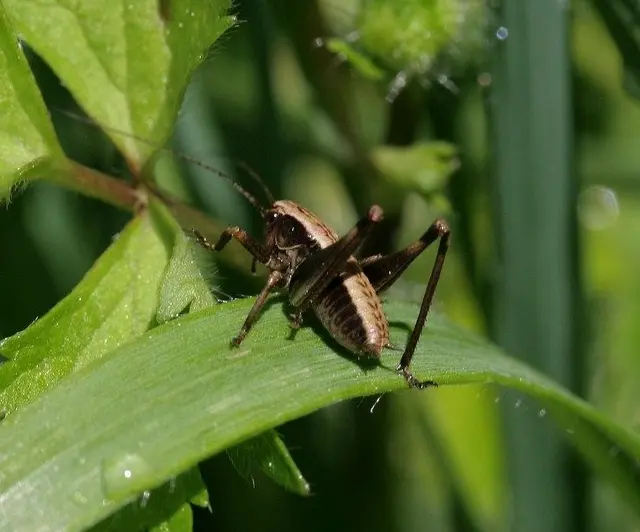
Beetles
While some budgies may find the hard exoskeleton of beetles a bit challenging to deal with, beetles can be a good source of fiber and other nutrients.
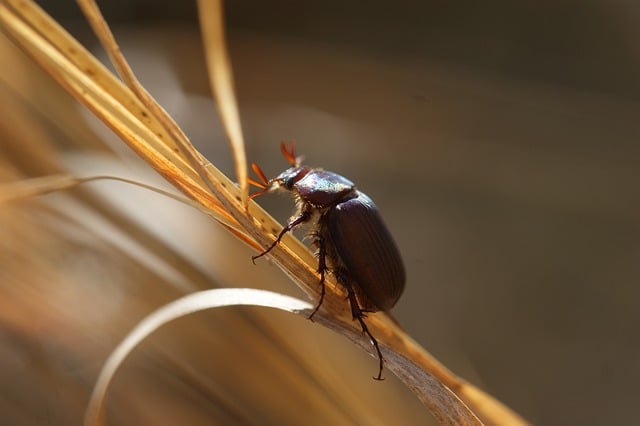
Moths
Moths, particularly their larvae, are a good source of vitamins and minerals for your budgie.
They’re also relatively easy for budgies to catch.
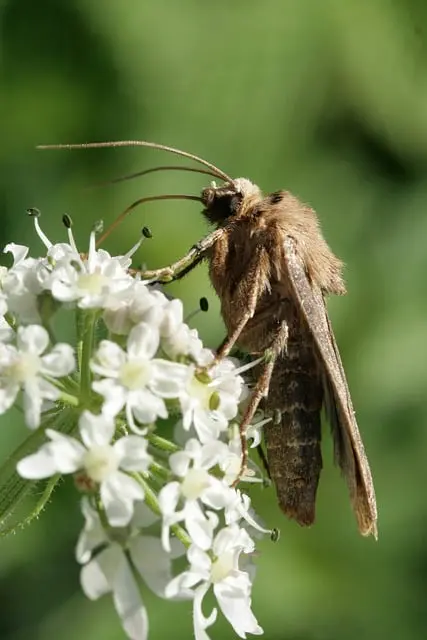
Flies
Flies can provide key minerals that are important for your budgie’s health.
They’re small and easy for budgies to ingest.
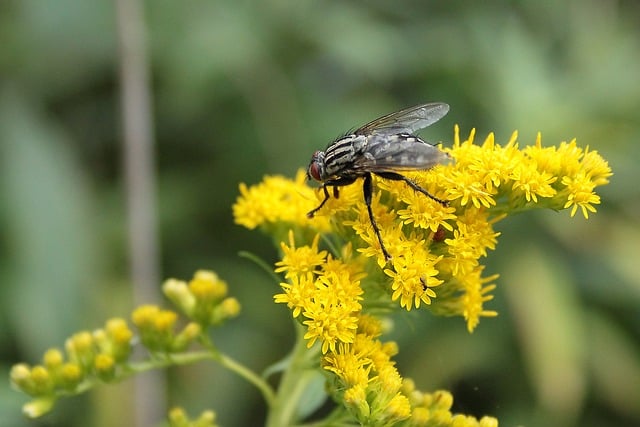
Ants
Ants are rich in protein and vitamins and can serve as a nutritious snack for your budgie.
However, ensure the ants are sourced from pesticide-free environments to avoid harm to your budgie.
Termites
Termites are full of fiber and can be a good dietary addition for your budgie.
Their small size makes them easy for budgies to consume.
Mosquitoes
Mosquitoes, though not typically a favorite, can be consumed by budgies.
They offer some nutritional benefits but should not form a significant portion of the budgie’s diet due to their potential to carry diseases.
Worms (Earthworms, Mealworms)
Earthworms, mealworms can be an excellent source of protein for budgies, and their soft bodies are easy to eat.
Gnats
Gnats are tiny flying insects that budgies can catch in mid-air.
They provide a bit of a fun challenge for the budgie and have some nutritional value.
Crickets
Crickets are packed with protein and are typically a favorite among budgies.
They are easy to digest and can be bought live or dried from pet stores.
Caterpillars
Caterpillars, particularly when in the larval stage, can offer an abundance of nutrition to your budgie, including vital vitamins and minerals.
Butterflies
Although beautiful, butterflies can also be part of a budgie’s diet.
However, they should be given sparingly due to their large size.
Wasps
Wasps should generally be avoided due to their sting.
If they are already dead and their sting is removed, they can be offered, but exercise caution.
Bees
Like wasps, bees should also be generally avoided.
Their stings can harm your budgie, and they don’t offer much nutritional value to make the risk worth it.
Dragonflies
These large flying insects can be a real treat for your budgie, provided they are safe to eat.
They offer good nutritional value but should be offered in moderation due to their size.
Damselflies
Damselflies, like dragonflies, are larger flying insects that can be a treat for your budgie.
They offer nutritional value but should be given sparingly.
Spiders
Budgies are known to eat spiders, which are rich in protein.
Some budgies may enjoy hunting small spiders, making it a form of entertainment as well as nutrition.
Aphids
Aphids are small insects that budgies can consume in large quantities.
They are particularly rich in carbohydrates, providing energy for your budgie.
Leafhoppers
Leafhoppers, tiny insects often found on the underside of leaves, are a source of protein for budgies.
Whiteflies
Whiteflies, though tiny, are packed with nutrients, including essential minerals that are good for your budgie’s health.
Scale Insects
Scale insects, while not the most appealing, can provide nutrition in the form of protein and carbohydrates to your budgie.
Lacewings
Lacewings are a source of vitamins and can be a nutritious addition to your budgie’s diet.
Earwigs
Earwigs are protein-rich insects that budgies can eat.
However, they should be offered sparingly due to their pincers.
Weevils
Weevils, while typically a pest for many, can provide essential nutrients to your budgie.
They are particularly rich in fiber.
Sawflies
Sawflies can be a good source of vitamins and minerals for your budgie, adding variety to its diet.
Leaf Miners
Leaf Miners, despite their small size, can provide a quick protein-rich snack for your budgie.
Psyllids
Psyllids can offer a good amount of protein and minerals to your budgie, making them a valuable addition to their diet.
Thrips
Thrips, though tiny, can be a source of vitamins and minerals for your budgie.
Fleas
Fleas can be consumed by budgies, though they are not a preferred food choice due to their potential to carry diseases.
Ticks
Ticks are generally not recommended for budgies due to their potential to carry diseases.
Lice
Lice can be ingested by budgies, but they are not typically part of their diet and can be harmful.
Mites
While mites can be eaten by budgies, they should be avoided if possible due to their potential to carry diseases.
Springtails
Springtails are small insects that are packed with nutrients.
They can provide vitamins and minerals necessary for your budgie’s health.
Silverfish
Silverfish, while not the most appetizing, can provide essential nutrients to your budgie.
They are rich in protein.
Firebrats
Similar to silverfish, firebrats can also provide a source of protein for your budgie.
Booklice
Booklice, though tiny, can provide a quick snack for your budgie.
However, they should be offered sparingly due to their potential to infest your home.
Stoneflies
Stoneflies can provide a good amount of protein and vitamins to your budgie, making them a valuable addition to their diet.
Caddisflies
Caddisflies are rich in protein and can be a nutritious addition to your budgie’s diet.
Mayflies
Mayflies, with their brief adult lifespan, can provide a quick, nutritious meal for your budgie.
Walking Sticks
Walking Sticks are a good source of fiber and can be included in your budgie’s diet.
Praying Mantises
Praying Mantises are generally too large for budgies to eat, but their smaller nymphs can be consumed and are rich in protein.
Shield Bugs
Shield Bugs are a good source of protein but their strong smell can be off-putting to some budgies.
Lace Bugs
Lace Bugs, small yet nutritious, can provide an array of vitamins and minerals for your budgie.
Ground Beetles
Ground Beetles, though a bit tough due to their hard shells, are a good source of protein.
Tiger Beetles
Tiger Beetles can provide your budgie with essential nutrients like vitamins and minerals.
Rove Beetles
Rove Beetles are not typically a part of a budgie’s diet due to their strong smell and potentially harmful secretions.
Click Beetles
Click Beetles can be consumed by budgies and are rich in protein.
Ladybugs (Ladybirds)
Ladybugs can be a source of vitamins for your budgie, but their bright colors can sometimes deter budgies from eating them.
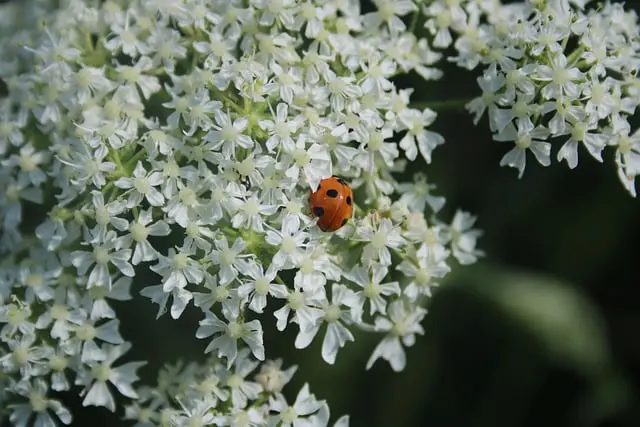
Scorpionflies
Scorpionflies, due to their potential to sting, should be avoided.
Sucking Lice
Sucking Lice should generally be avoided due to their potential to carry diseases.
What Are The Biological Benefits Of Your Budgie Eating Insects?
Eating insects provides budgies with an array of biological benefits.
For instance, the high protein content found in insects like grasshoppers and ants helps to bolster the bird’s muscular development.
Minerals obtained from flies, such as calcium, support bone health.
Moreover, the fiber in beetles and termites aids in digestion.
How To Give Insects To Your Budgie?
Feeding insects to your budgie requires careful consideration and a thorough understanding of their dietary needs and preferences.
It’s not just about tossing a few bugs into their cage, but it’s also about ensuring the insects are safe, nutritious, and well-received by your budgie.
The first step to offering insects to your budgie is sourcing the insects.
You could get insects from your backyard, but there’s a risk that these insects may have been exposed to pesticides or other chemicals that could harm your budgie.
Therefore, a safer alternative is to purchase insects from reputable pet stores or suppliers that specialize in bird food.
They sell insects in various forms suitable for budgies, such as live insects, dried insects, or insect-infused bird pellets.
Live Insects
If you opt for live insects, it’s best to offer them in a shallow dish.
This way, the budgie can peck at the insects, simulating their natural foraging behavior.
You may notice that the act of catching their own food can also stimulate your budgie, contributing to their mental well-being.
Dried Insects
Dried insects can be mixed in with your budgie’s regular seed mix or offered in a separate dish.
They provide an excellent protein source and can be stored for a long time without the need for any special storage conditions.
With Pellets
Insect-infused pellets are another option.
These are formulated to offer a balanced diet for budgies, containing not only the protein from insects but also other essential nutrients that your budgie needs.
How Often Should I Feed My Budgie With Insects?
The frequency of feeding your budgie with insects relies heavily on their individual nutritional requirements.
Factors like age, health, and activity level come into play.
Insects are rich in protein and other essential nutrients, making them a valuable addition to your budgie’s diet.
However, they should not form the majority of their diet.
They should be considered a treat or a dietary supplement rather than a staple.
As a general guideline, offering insects to your budgie once or twice a week should be adequate.
What Are The Pros Of Giving Bugs To Your Budgie?
Feeding insects to your budgie has several pros.
It supplements their diet with essential nutrients that aren’t available in seeds or vegetables.
Furthermore, the action of catching and eating insects can mentally stimulate your budgie, providing an engaging activity.
What Are The Cons Of Giving Bugs To Your Budgie?
Despite the benefits, there are a few drawbacks to consider.
The most glaring one being the potential risk of disease transmission.
Some insects might be carriers of harmful bacteria or parasites.
FAQs About Budgies & Insects
Are Insects Safe For All Budgies To Eat?
Generally, insects are safe for budgies to eat.
However, caution must be exercised in sourcing the insects, ensuring they are free from pesticides and other harmful substances.
My Budgie Doesn’t Like Insects, What Should I Do?
If your budgie seems averse to eating insects, don’t be alarmed.
Budgies have distinct tastes, and some may simply not enjoy them.
As a responsible budgie owner, your task is to provide a well-rounded diet, including a range of other food items they enjoy.
Are there specific insects that budgies prefer?
Indeed, while budgies have a wide range of insects they’ll consume, they show a preference for smaller, easier to catch, and digest insects such as aphids or small beetles.
Does the age of the budgie affect its ability to eat insects?
Absolutely, younger budgies may struggle with larger insects.
Therefore, it is good for them with smaller insects or insect larvae, which are easier to eat and digest.
What is the impact of insects on a budgie’s behavior?
Insects in a budgie’s diet can contribute to their overall well-being.
A healthy diet can impact their energy levels and plumage, which in turn can influence their mood and behavior.
Can I supplement my budgie’s diet with store-bought insects?
Yes, store-bought insects from reputable pet food suppliers are generally safe and can provide essential nutrients.
However, it’s best to consult with a vet or a pet nutrition expert before introducing new food items.
Is it possible for a budgie to overeat insects?
Yes, budgies can overeat insects if given free access.
While insects provide vital nutrients, an excess can lead to obesity and other health issues.
It’s important to maintain a balanced diet.
What precautions should I take when feeding my budgie insects?
Ensure that the insects are not exposed to pesticides or other harmful chemicals.
Insects should be appropriately sized for the budgie’s small beak and digestive system.
Always monitor your budgie while it’s eating new food items to ensure it’s not having any adverse reactions.



